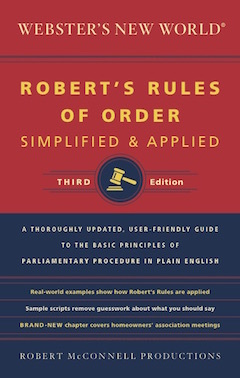Executive Sessions & Open Meeting Laws
drvideo@comcast.net
Volume 9, Issue 1, Nov., 2003
Internet Newsletter Volume 9, Issue 1
Parliamentary Newsletter
Volume 9, Issue 1
EXECUTIVE SESSION and OPEN MEETING LAWS
Some organizations have closed meetings. This means that only members of the organization can attend the meetings. Or in the case of boards and committees of these organizations, only members of the boards and committees can attend board and committee meetings. This newsletter article does not concern these types of organizations, but those who operate under open meeting laws—county and city governments, school boards, homeowner and condo associations and others organizations where guests may attend the meetings. This article will primarily address government bodies and board meetings of homeowner and condo associations where state laws require meetings to be open to members.
Open Meetings
Open meeting laws allow members of the association or members of the public to attend meetings of their governing bodies. In the case of city councils or school boards, constituents have the right to attend and observe the meetings. But they do not have the right to speak, make motions, or vote. Often governmental bodies set aside a portion of the meeting to hear comments by their constituents, but they usually are not required to do so.
In board meetings of Homeowner and Condo Associations, members usually have the right by state laws to attend the meetings. However, they too are only allowed to observe the proceedings of the board. Unless the board allows them to speak, they have no right to speak, to make motions or vote at the board meetings.
When attending board meetings, those observing should be respectful, quiet, and attentive. If they are allowed to speak, they should do so only when they have been allowed to speak. If members observing become disruptive, the board has every right to ask them to leave.
Executive Session
Sometimes during a public meeting something of a very sensitive nature may arise. It may have to do with discipline of employees, discussing an employment contract, or consulting with the attorney. State law allows and provides for the governing body to go into executive session or a closed meeting. This means that everything said or done in executive session is secret or confidential. Anyone who breaks the confidentiality of executive can be disciplined by the organization.
To go into executive session a member must make a motion, it needs a second and is debatable. It takes a majority vote to adopt. If the members vote to go into executive session, all nonmembers must leave the room until the board votes to end executive session. Minutes should state that the members voted to go into executive session and the reason for doing so. It also might be helpful to include the time the board went into executive session and when it ended executive session. For example the minutes might state:
“The board voted to go into executive session to consult with the attorney about the legal implications canceling the contract with the XYZ Company. The executive session began at 10:15am and ended at 10:45am”.
Usually boards only go into executive session to discuss a matter and not take action. All minutes of executive session can only be approved in executive session. Since minutes state actions adopted rather than discussion, only those actions approved in executive session are recorded in those minutes.
Let’s say a school board is deciding whether to renew the contract of the superintendent. A member of the school board has received some information that he feels will affect the decision. But this information should not be made known to the public. The member of the board would move to go into executive session. If adopted, the chair would state that the meeting is now in executive session. The chair would either ask everyone to leave or they might retreat into another room in the building with only the board members present and anyone else that they feel needs to be there—like the attorney or the board secretary. At this time the member would reveal the information. The board would discuss it only. Someone moves to end the executive session. If that is adopted by a majority vote, then the board returns to the open meeting and proceeds either with discussion or with a vote. Everyone in the executive meeting is sworn to secrecy. If any of the information is divulge it could open the board to a lawsuit by the superintendent. The member who leaked the information could also be removed from office or perhaps sued.
The purpose of executive session in governmental bodies is not to hide important information from the members or the public, but to protect the innocent. In this case the information given about the superintendent may be false. It would be very harmful to the superintendent to have his good named smeared by these falsehoods if made public. It would also expose the board to criticism and possible legal action for spreading falsehoods.
Those serving on governing bodies should use executive session judiciously and wisely. It should never give the appearance of doing something behind the backs of the constituents or the members.
